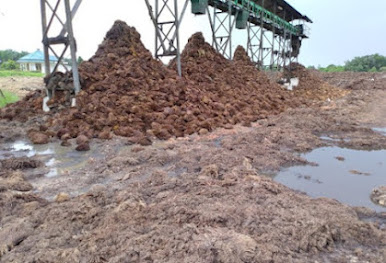Reclamation of ex-coal mining land is the obligation of the mining company, but often this is not done properly for various reasons. These are mainly due to weak rule enforcement and light sanctions. With the area of ex-coal mines that has reached millions of hectares and the reclamation efforts are needed, but the realization in the field is still very minimal, making environmental damage even greater. The thing that can encourage efforts to improve the ex-coal mining land is the profit or economic factor that can be obtained. This means that if the reclamation effort also bring economic benefits - in addition to environmental benefits, of course - then the coal companies will also be happy to do so. So what activity is it?
 |
| The photo is taken from here |
As a basic thing and the entry point for the above business is improving the quality of the land or soil of the ex-coal mines. There are a number of ways to do this, but the use of biochar is one of the best options. With biochar not only increases the pH or acidity of the soil so that many nutrients will be absorbed by plants better and soil microbial activity to decompose organic matter is more active, but it is also able to absorb a number of harmful chemical elements in the soil, increasing soil organic carbon that can last hundreds of years and also absorbs the greenhouse gase from atmosphere. The biochar can be made from a number of agricultural, forestry and agro-industrial wastes, such as wood chips from logging or from palm oil mill waste such as empty fruit bunches and fiber. A number of areas in Kalimantan are not only rich in coal deposits and also currently many of these ex-coal mining lands are abandoned, as well as a lot of biomass materials such as forest waste and palm oil mill waste for the production of biochar.
In order to reduce CO2 emissions in the atmosphere, biochar is also able to absorb CO2 from the atmosphere (carbon sequestration) and is a carbon negative scenario. The biochar applied to the soil is a carbon sink, as an option for carbon credit other than carbon offset. In the current era of decarbonization, efforts to reduce CO2 level in the atmosphere are important. In Indonesia, where there is still a lot of forest land, carbon credit can be obtained from the absorption of CO2 by the trees in the forest, so that the forest acts as a carbon sink as well. But in other countries where the use of fossil energy is very large or massive, they must reduce the adverse climate impacts caused by burning fossil energy materials, especially coal. They can buy carbon credits on this biochar application.
Coal is the most widely used fossil energy for power generation in the world today and Indonesia is one of the producers of such coal. Although in the near future the use of coal will be reduced and in some countries it will be stopped altogether, but the negative impacts of coal mining are still many, damaging and even endangering the environment. This is an urgency to improve the land or ex-coal mining land which is estimated to reach 8 million hectares in Indonesia. On the one hand, coal power plants can buy carbon credits for biochar applications like the scheme above. Palm oil mills on the other hand also produce a lot of solid waste, especially empty fruit bunches (EFB) that can be used for the production of biochar. These big companies could collaborate to solve climate problems due to the increasing concentration of CO2 in the atmosphere. To this day, it is reported from the Mauna loa observatory, in Hawaii, United States that the concentration of CO2 in the atmosphere has exceeded 400 ppm or there is still an increase of about 2 ppm every year, even though the global target is to decrease the concentration to only 350 ppm.






Tidak ada komentar:
Posting Komentar